|
|
|
Sort Order |
|
|
|
Items / Page
|
|
|
|
|
|
|
| Srl | Item |
| 1 |
ID:
116483
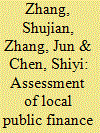

|
|
|
|
|
| Publication |
2012.
|
| Summary/Abstract |
Making use of the data envelopment analysis (DEA) technique and taking undesirable fiscal phenomena into account, this paper comprehensively quantifies the public finance performance of local governments in China during the course of fiscal decentralization reform. The introduction of undesirable fiscal outcomes into this assessment makes it possible to identify meaningful and informative characteristics of local public finance performance in China. When reforms are first implemented, local public financial performance improves because undesirable fiscal phenomena have not yet become too serious. The tax sharing system reform did not work well in its early stages, and negatively impacted public expenditure efficiency. The reform started to play a substantial role between 2001 and 2005, when local governments experienced better public finance performance. Corresponding to the deterioration of the financial sector in recent years, local public financial performance worsened after 2007. Further reform of the current fiscal and taxation system is necessary in China, to ensure a brighter future for the nation.
|
|
|
|
|
|
|
|
|
|
|
|
|
|
|
|
| 2 |
ID:
117717


|
|
|
|
|
| Publication |
2013.
|
| Summary/Abstract |
The relationship between fiscal decentralization and corruption is highly controversial but insufficiently tested with respect to China. This article empirically tests whether fiscal decentralization aggravates corruption in China's local governments. To acquire more robust results, we employ multiple corruption and fiscal decentralization measures and collect data for 31 provinces from 1998 to 2008. Fixed effects panel models estimate the impact of fiscal decentralization on corruption after controlling for gross regional product per capita, the relative wage in the public sector compared to the private sector, political leadership changes, education levels, law enforcement and the number of NGOs. Our findings suggest that China has experienced a trend towards fiscal recentralization rather than decentralization in the 2000s. We also find the moderating effect of the level of law enforcement on corruption: fiscal decentralization in local governments with strong law enforcement deters corruption but the opposite relationship is found when their law enforcement is weak. The implication of our research is that a sound legal system and political will are prerequisites for successful fiscal decentralization.
|
|
|
|
|
|
|
|
|
|
|
|
|
|
|
|
| 3 |
ID:
079936


|
|
|
|
|
| Publication |
2007.
|
| Summary/Abstract |
The question of whether fiscal decentralization has affected economic growth since the 1994 fiscal reform in China is interesting to both policy makers and economists. Using a simple model of endogenous growth that incorporates spending by different levels of government, and a panel data set for 30 provinces for the period of 1994-2002, this paper finds that fiscal decentralization contributes significantly to economic growth. This finding is consistent with the theoretical prediction that fiscal decentralization can increase economic efficiency. In addition, this paper attempts to investigate how the relationship between fiscal decentralization and provincial growth differs in the different regions considered. For this purpose, the 30 Chinese provinces and regions are categorized into three conventional economic belts that comprise the eastern, central, and western areas. This study finds that the effects of fiscal decentralization on economic growth vary among these three regions.
|
|
|
|
|
|
|
|
|
|
|
|
|
|
|
|
| 4 |
ID:
143362
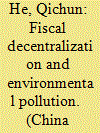

|
|
|
|
|
| Summary/Abstract |
China's environmental pollution casts a shadow on its economic success. Concerning fiscal decentralization, China introduced the rule-based tax assignment system in 1994. To avoid the structural change in underlying fiscal regimes, we use the provincial panel data during the period 1995–2010. We find that fiscal decentralization has no significant effect on environmental pollution as it is measured per capita emission of wastewater, waste gas or solid waste in system GMM (Generalized method of moments) estimation. Our results are robust when we use different measures of fiscal decentralization. We further find that fiscal decentralization has a significant, positive effect on pollution abatement spending and pollutant discharge fees, which indicates possible mechanisms for fiscal decentralization to help protect the environment.
|
|
|
|
|
|
|
|
|
|
|
|
|
|
|
|
| 5 |
ID:
130541
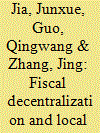

|
|
|
|
|
| Publication |
2014.
|
| Summary/Abstract |
Since the tax-sharing reform in 1994, the Chinese fiscal system has exhibited a marked vertical fiscal imbalance-a mismatch between expenditure and revenue assignments-at the local levels, which may cause the common-pool problem in local governments' behavior. Using a large fiscal dataset at the county level from 1997 to 2006, this paper studies the effects of fiscal decentralization on local expenditure policy and analyzes how the vertical fiscal imbalance shapes these effects. The estimation results show that expenditure decentralization increases government spending and leads to a fund allocation with a larger weight on capital construction and smaller weights on education and administration. In contrast, revenue decentralization has little influence on local government expenditures. We show that the differences in the effects of expenditure and revenue decentralization can be attributed to the distortionary effects caused by the vertical fiscal imbalance and, thus, offer support to the importance of the common-pool problem at the county level of China's fiscal system.
|
|
|
|
|
|
|
|
|
|
|
|
|
|
|
|
| 6 |
ID:
167888
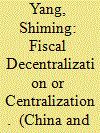

|
|
|
|
|
| Summary/Abstract |
If fiscal decentralization promotes growth, why do some regions decentralize more than others? This article identifies the growing divergence of fiscal centralization among Chinese cities and explains it in a public finance framework. It argues that fiscal decentralization and its economy‐liberalizing effect entail significant short‐term fiscal risk. The more a locality relies on uncompetitive business ownership for fiscal revenue, the less likely fiscal decentralization is to occur. This article compiles a dataset of 20 provincial capitals between 1999 and 2016 to test for the connection between a city's tax base and its fiscal centralization level. It then pairs two “most similar” cities to trace how fiscal security concerns drove their fiscal and economic policies apart. This article adds a micro‐level perspective to the literature on fiscal federalism. By pointing out the fiscal constraints confronting local governments, it offers a new angle to understand the different growth paths of Chinese cities.
|
|
|
|
|
|
|
|
|
|
|
|
|
|
|
|
| 7 |
ID:
163512


|
|
|
|
|
| Summary/Abstract |
In 1994, after a period of substantial fiscal decentralization that has been credited with leading to historically unprecedented growth rates but significant fiscal decline, China introduced a new fiscal system that recentralized the collection of tax revenues. The economic and political consequences of this new Tax Sharing System (TSS) have been debated extensively in the literature, especially because of the renewed interest in fiscal federalism and its interaction with political institutions and economic outcomes. The question central to this debate has been whether the TSS constitutes a significant departure from decentralization with adverse effects on fiscal federalism or whether the recentralization of revenues under the TSS corrects for the overshooting in decentralization with beneficial economic outcomes. This paper exploits the staggered introduction of the TSS across regions and over time for econometric identification purposes and finds robust causal evidence that the TSS had a positive impact on economic outcomes.
|
|
|
|
|
|
|
|
|
|
|
|
|
|
|
|
| 8 |
ID:
147427


|
|
|
|
|
| Summary/Abstract |
Land disputes have been an important risk to social stability in China since the turn of the century. This paper uses provincial data on illegal land uses during the period 1999–2010 as a proxy for the intensity of land conflicts to investigate the effects of foreign direct investment (FDI) and fiscal decentralization on jurisdictional land conflicts. The results show that the FDI growth rate has a positive and significant impact on the growth rate of illegal land use when there is a high degree of fiscal decentralization. We thus provide evidence supporting the hypothesis that regional competition for FDI, as shaped by fiscal decentralization, tends to raise conflicts over land in China.
|
|
|
|
|
|
|
|
|
|
|
|
|
|
|
|
| 9 |
ID:
141098
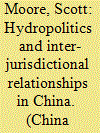

|
|
|
|
|
| Summary/Abstract |
Inter-jurisdictional water resource issues constitute a growing political and economic challenge in China. This article examines three such cases of hydropolitics, namely large dam construction, water resource allocation, and downstream water pollution, through the lens of central–local relations. It argues that the hydropolitics in China are characterized by the pursuit of localized preferences within the constraints imposed by a centralized political system. In each case, the primary actors are sub-national administrative units, who adopt various competitive strategies to pursue their own localized interests at the expense of neighbouring jurisdictions. This article argues that although vertical control mechanisms in the Chinese system effectively limit central–local preference divergence, they do little to contain horizontal conflicts between sub-national administrative units. The paucity of formal inter-jurisdictional dispute resolution mechanisms is a major barrier to meeting water resource challenges, and inter-jurisdictional collective action problems are likely to pose growing difficulties for the Chinese political system.
|
|
|
|
|
|
|
|
|
|
|
|
|
|
|
|
| 10 |
ID:
156454


|
|
|
|
|
| Summary/Abstract |
Using longitudinal Chinese county-level data from 2005 to 2007, we examine the causal effect of the Province-Managing-County fiscal reform on primary education spending by combining propensity score matching with the difference-in-difference method and allowing for the concurrent County Strengthening and Power Expansion reform. While the fiscal reform significantly increases per pupil expenditure on elementary education, there is little evidence showing that this fiscal reform narrows the urban-rural expenditure gap within counties. This Province-Managing-County reform, on the other hand, aggravates regional educational spending disparity in elementary schools based on the observation that the reform has caused a higher increase of per pupil educational spending in the affluent Eastern Region than the increase in Central and West China.
|
|
|
|
|
|
|
|
|
|
|
|
|
|
|
|
| 11 |
ID:
113045


|
|
|
|
|
| Publication |
2012.
|
| Summary/Abstract |
Does fiscal decentralization empower sub-national governments to raise sufficient revenue from local sources thereby reducing their dependence on the national government? This paper addresses this question by focusing on Indonesia's most recent decentralization policy and assessing and analysing the role of local governments in this regard. Based on data collected from two different locations in Eastern Indonesia the paper shows that the dependency of local authorities on central government is excessive and that the share of local revenue in regional budget has remained rather small. It also shows that while the fiscal power granted to local governments is limited, a combination of politico-economic and contextual factors has further undermined the prospect of revenue mobilisation at the local level.
|
|
|
|
|
|
|
|
|
|
|
|
|
|
|
|
| 12 |
ID:
124563
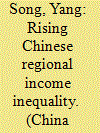

|
|
|
|
|
| Publication |
2013.
|
| Summary/Abstract |
This article examines the quantitative effects of the Chinese fiscal system on the increasing regional income inequality in China, from 1978 to 2007. Fiscal decentralization is a multifaceted concept not likely to be captured by a single measure. This paper investigates the evolution of three aspects of fiscal decentralization including spending decentralization, revenue decentralization, and autonomy power, and tests the effects of each aspect on the regional income inequality in China in the past thirty years. Several critical findings were obtained through econometric analysis. The fiscal decentralization on spending side in China has contributed to rising income inequality over the last three decades. On the revenue side, the fiscal system became more decentralized from mid-1980s to 1994, and re-centralized after the 1994 tax sharing reform. The econometric analysis shows that the increase in revenue share of local governments from mid-1980s to 1994 indeed increased regional inequality, while the revenue re-centralization in 1994 only had a modest effect on reducing regional inequality. In terms of autonomy power measured by how public spending at local level of government is maintained by its own revenue, the degree of fiscal decentralization decreased since mid-1980s, and experienced a sharp reduction in 1994 due to the tax sharing reform. The autonomy power has mixed effects on regional inequality in the two periods, before and after the 1994 reform, depending on the targeting of fiscal transfers and the incentives of local governments. As it turns out, fiscal decentralization may not be automatically equalizing or anti-equalizing, whereas how fiscal decentralization is promoted is important for how it impacts regional inequality.
|
|
|
|
|
|
|
|
|
|
|
|
|
|
|
|
| 13 |
ID:
082031
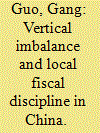

|
|
|
|
|
| Publication |
2008.
|
| Summary/Abstract |
This article examines local fiscal behavior in contemporary China against the backdrop of decentralized spending responsibilities and recentralized revenues. Vertical imbalance after the 1994 tax-sharing system reform, coupled with other features of the fiscal institutions, is not conducive to conservative local fiscal behavior. Moreover, a main driving force behind the expansion of local governments is the politically motivated intergovernmental transfer scheme. The center in effect "buys" political stability in sensitive areas while holding local leaders accountable for their tax efforts. A dynamic panel analysis of Chinese counties reveals that a million-yuan increase in general transfer payment and salary raise subsidies would add, respectively, fifteen and sixteen employees to the county government payroll, other things being equal. At the same time, increased subsidies from upper-level governments do not "crowd out" or significantly affect local tax effort. Additional dynamic panel data analysis at the provincial level produced similar findings
|
|
|
|
|
|
|
|
|
|
|
|
|
|
|
|
|
|
|
|
|